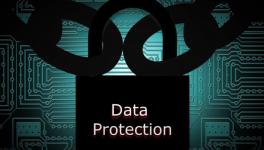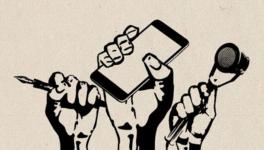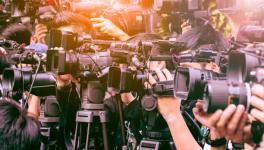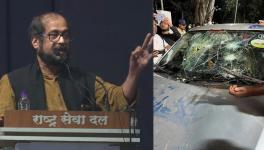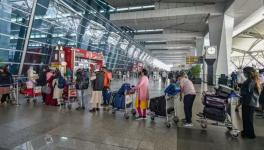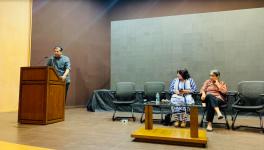Surveillance and Freedom of Press – A Call to Public Action
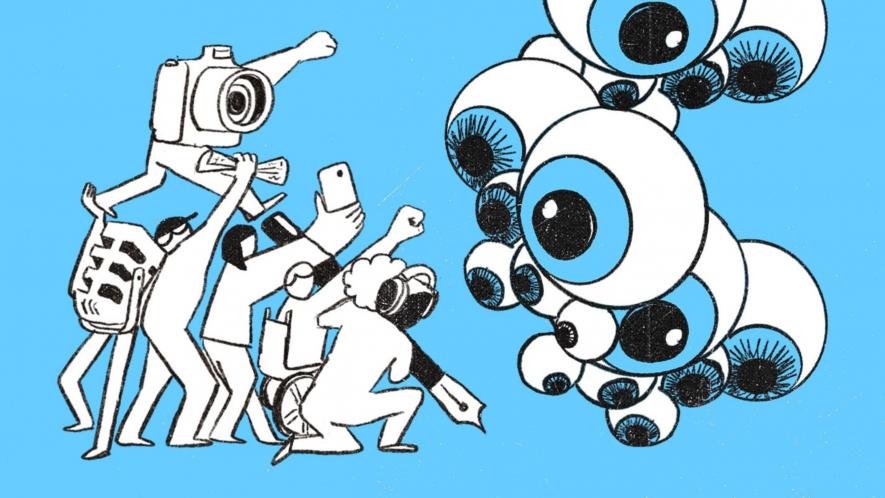
Image Courtesy: accessnow
“We see when you are sleeping,
We see when you are awake,
We know if you’re with or against us,
So be quiet for goodness sake.”
— a parody modelled on the popular song Jingle Bells sent by a former IAS officer to the author
“Surveillance and Freedom of Press”.
In mid-December 2023, the US Federal Trade Commission concluded that the employees of Rite Aid, a pharmacy chain, acted on false alerts from its facial recognition systems, followed customers around stores, searched them and ordered some to leave. If the customers refused, the store called the police to confront or remove them, at times in front of friends and family. Rite Aid used facial recognition technology to falsely identify people of colour and women as likely shoplifters. Rite Aid’s actions disproportionately affected people of colour, especially Black people, Asians and Latinos, all in the name of keeping “persons of interest” out of hundreds of Rite Aid stores in cities, including New York, Philadelphia and Sacramento, the commission said.
This is just one example of how surveillance technologies are intruding into our everyday life, including in fields as essential and indispensable as medicine purchases.
In journalism, surveillance kicked in long before technology achieved the cutting edge status that it has today.
One example is the practice of government offices maintaining registers and making it mandatory for journalists to make an entry identifying the officials they are meeting on a particular day. This was not the case earlier: journalists with accreditation, which is granted after careful and strict scrutiny by government-appointed bodies, could enter government offices and speak to officials, usually in the afternoon when the workload sometimes eases. The register system is primitive but very effective.
If an article that is unpalatable to the government is published on a particular day, all that the government needs to do to identify the source is to check the register and see which officials met the journalist concerned. This strikes at the very root of source confidentiality. Source confidentiality has no legal backing in India, but is considered vital for the functioning of the Press. If sources can be identified by vindictive administrations eager to invoke the Official Secrets Act at the drop of a hat, journalism and accountability – and democracy, by extension – will be the ultimate sufferers.
I mentioned this to point out that sophisticated technologies are not needed if a government decides to undermine the pillars on which a democracy is built. But as the case of the Rite pharmacy showed, more advanced the technology, more vulnerable it is to misuse.
Often, civil society – journalists and lawyers included – fail to spot the symptoms of a surveillance raj or regime.
I request you to recall how we looked the other way after some initial murmurs when almost our entire urban stretches were brought under closed circuit TV and other surveillance cameras. Along with law enforcement agencies, private entities, including households, jumped into the surveillance cauldron and installed camera after camera in every nook and corner.
Along with this came, the craze for pointing smartphones at anything and everyone and snapping pictures without showing the basic courtesy of asking permission. In the process and without realizing it, we became the most surveilled society in history, bigger than what even the Orwellian Big Brother could do.
Fighting crime and monitoring traffic violations were cited as excuses for condoning the invasion of the surveillance cameras. So much so that, modern law-enforcement agencies have almost forgotten the pre-CCTV skills of deduction, detection and collection of evidence.
When we hear of a crime now, the first question we involuntarily ask is: “what about CCTV footage” or “where is the CCTV footage?” As if, before CCTVs became fashionable, no crime could be solved. The question – “where is the CCTV footage?” – is also an admission that we have practically given up our precious right to privacy and that we now consider it unusual if we are NOT under surveillance.
It is often said that some police stations in some parts of the country have corners beyond the reach of CCTV cameras, where bribes are exchanged and third-degree methods are deployed -– away from the prying eyes of the cameras that can incriminate public servants.
I am tempted to recount a story I had heard when I was a trainee journalist in the early 1990s when cell phones had not made their presence felt in India. I am not sure if the story is true but my objective is to merely illustrate how intrusive technology has become in a matter of decades.
A very important person in New Delhi used to “disappear”, every once in a while, to conduct an extramarital affair. Some of his rivals within his own party decided to settle scores with him. One day when the VIP was spending time with his lover in a guesthouse, someone called a police station and reported that the minister is missing. With no cell phones to track him and his staff tight-lipped, the police launched a man-missing search. Eventually, a very exasperated — and angry — VIP was found in the guesthouse.
Now, in the age of cell phones, the VIP would have been spared the embarrassment and the police could have saved the resources used for the manhunt. Three decades later, earlier this week on Christmas Eve, a retired IAS officer sent me a parody modelled on the popular song Jingle Bells.
One stanza went like this: “We see when you are sleeping, we see when you are awake, we know if you’re with or against us, so be quiet for goodness sake.”
From the crude register, we have now come to the age of Pegasus, a spyware that can only be bought by government agencies.
Now it is possible not just to snoop on what reports a journalist is working on, it is also possible to plant evidence against the journalist to implicate the journalist in trumped-up cases. I hope the enormity of the crisis is clear for you.
This ability of State-sponsored actors to embed themselves in the deeply private corners of watchdogs has grave implications for not just journalism but also the judiciary, the Opposition and the other checks and balances the republic has put in place after much thought and deliberation.
As if all these are not enough, we now have to cope with Artificial Intelligence also. Technology usually has three phases: enormous advantages, frightening potential for misuse and reassuring antidotes.
I hope we reach the third stage fast enough.
However, I must digress here and speak about at least one instance of how technology has helped. The media is no saint or angel. It has its share of devils.
Recently, in Kerala, a minister’s aide was accused of taking a bribe from a job aspirant. A channel went to town with the news. The young aide would probably have been hanged in a media trial. But, fortunately for him, a video surfaced, showing him at a wedding venue in another district at the time when the accuser claimed that money was handed over outside the secretariat. Even without the video, in the good old days, accounts by eyewitnesses at the wedding would have been sufficient to establish his innocence. But of late, our media trials and television channels make me wonder if we have forgotten a principle that forms the cornerstone of jurisprudence: presumed innocent until found guilty.
I blame the media as well as a section of lawyers who are willing to appear on TV and comment on cases that are sub judice. Both the media and the legal fraternity need to exercise restraint on this front. I did not elaborate on the Pegasus scandal because all of us know enough – or too little – about the scandal.
The sheer sweep of the Pegasus scandal that broke in July 2021 was astounding: the spyware was allegedly used on Opposition leaders, judges, journalists, investigators and statutory officials.
Fewer than 30 months later, on October 30, this year, Apple sent alerts to Opposition politicians and journalists that State actors may have tried to break into their iPhones. Among the politicians were some of the senior-most public figures and well-known journalists in the country, including Congress president Mallikarjun Kharge and The Wire news portal co-founder Siddharth Varadarajan.
Let us pause for a moment and dial back to the latter half of the 20th century. The offices of the Democratic Party were sought to be bugged in an election year in the US during the Nixon presidency.
The Washington Post newspaper focused on the Watergate scandal for 788 days – until President Nixon was forced to resign. The Pegasus scandal in India was far bigger than the Watergate scandal in its sweep and reach. If one party was targeted in the US, a wide cross-section of society, including several pillars of our republic, were suspected to have been targeted. Yet, the political and ethical outrage in India was limited in its intensity.
I quote from a column I wrote for The Telegraph newspaper this month. An American judge played a decisive role in the Watergate case. Judge John J. Sirica “kept badgering defendants and witnesses on matters not covered in the indictment —namely, the financial and institutional involvement of the White House”. The judge took the “contentious step of passing exceptionally long provisional sentences on the defendants” (which allowed the accused to ponder the punishment for a few months). Sirica indicated that if the defendants spoke frankly at the hearings, the sentences would be reduced. Sirica ordered Nixon to surrender his recordings of the White House conversations to federal prosecutors. “Almost single-handedly, with great courage and risk to his reputation, Sirica had broken the case wide open.”
In India, the Pegasus controversy reached the Supreme Court. A court-appointed committee concluded last year that malware was found in five out of 29 phones submitted to it, but the use of Pegasus could not be confirmed. The committee said the Centre “has not cooperated” with the investigations. Parts of the reports were made public but the full files remain in sealed covers. In May this year, the apex court said an early date would be set for examining the status of various recommendations made by the committee.
Just days ago – that is December 28, 2023 – months after the Supreme Court looked into the allegations, Amnesty International issued the following statement. This is what convinced me that I must speak here today. Please keep in mind the names may sound familiar but these are NEW, I repeat, NEW revelations.
I quote from the Amnesty statement. “Amnesty International, in partnership with The Washington Post, has unearthed shocking new details about the continued use of the highly invasive spyware Pegasus to target prominent journalists in India, including one who had previously been a victim of an attack using the same spyware.
Forensic investigations by Amnesty International’s Security Lab confirmed that Siddharth Varadarajan, Founding Editor of The Wire, and Anand Mangnale, the South Asia Editor at The Organised Crime and Corruption Report Project (OCCRP), were among the journalists recently targeted with Pegasus spyware on their iPhones, with the latest identified case occurring in October 2023.”
“Our latest findings show that increasingly, journalists in India face the threat of unlawful surveillance simply for doing their jobs, alongside other tools of repression including imprisonment under draconian laws, smear campaigns, harassment, and intimidation,” the head of Amnesty International’s Security Lab said. “Despite repeated revelations, there has been a shameful lack of accountability about the use of Pegasus spyware in India which only intensifies the sense of impunity over these human rights violations.”
The Security Lab recovered evidence from Anand’s device of a zero-click exploit which was sent to his phone over iMessage on 23 August 2023, and designed to covertly install the Pegasus spyware. A zero-click exploit refers to malicious software that enables spyware to be installed on a device without requiring any user action from the target, such as clicking on a link. The attempted targeting of Anand’s phone happened at a time when he was working on a story about an alleged stock manipulation by a large multinational conglomerate in India, the Amnesty statement added.
The Union home minister is fond of speaking about “chronology”. The latest Pegasus chronology is telling: On August 23, OCCRP seeks the company’s comment. Within 24 hours, the Pegasus spyware was sought to be planted in Anand’s phone. How is it that a spyware only a State agency can buy gets activated when a private company is asked a question? I am scared to name the company here because I do not know whether in the one hour I took to travel from Calcutta to Howrah, if the company has obtained a legal order barring a public debate on the issue.
The NSO Group, which owns the Pegasus software, told The Washington Post that it sells its products only to government intelligence and law enforcement agencies, and that its technologies are licensed for the sole purpose of fighting terror and major crime. Indian authorities have until today provided no clarity or transparency on whether they have procured or used the Pegasus spyware in India, Amnesty said.
Please note the point that someone in our country is repeatedly and with impunity targeting the working tools of journalists again and again. The operative phrase here is “again and again”.
The Amnesty revelations suggest spyware abuse is continuing in India unabated EVEN AFTER the highest court of the land looked into the issue. If this does not terrify you, what will? I am compelled to ask this question: have our institutions, have our pillars, have our civil society, and have our collective voice lost the will and ability to stop shadowy players who declare with defiance “We don’t give a damn”?
How long will we allow these thugs with technology to violate our freedoms and our very lives? Can we name any other democracy whether such things are exposed but no one -– absolutely no one -– is held accountable?
Against that backdrop, I am constrained to ask: has large sections of Indians entered a post-morality, post-probity phase, much like the era of post-truth? I hope I am wrong and your answer is a resounding “no”. But if you also think that we have been sucked into a post-morality phase, democracy as we know it is in deep peril.
Our democracy will check all the boxes: the world’s largest elections, quick results, a clear majority and a government that swears by the Constitution. But beneath the surface – if journalists are unable to fulfil their responsibilities because of fear of surveillance, if judges are constrained to speak out after retirement and large sections of the minorities and the marginalized live in fear – it would mean that our democracy has been hollowed out in front of our eyes which are blinded by the dazzle of its outer shell.
As I conclude, I come to the most important point of this conversation. Have we realized how surveillance of journalists and others has turned on its head one of the fundamental principles of democracy?
The GOVERNED are supposed to keep a watch over the GOVERNORS.
Unfortunately, in our time, it is the governors who are keeping the governed under surveillance.
With great sadness, I recall the immortal words of US Supreme Court Justice Hugo Black in 1971 in the Pentagon Papers case: “The founding fathers gave the free press the protection it must have to fulfill its essential role in a democracy. The press was to serve the governed, not the governors.” I spoke of my grief because of the current deplorable cosiness between large sections of the media and the governors. The press was protected so that it could bare the secrets of the government and inform the people. Only a free and unrestrained press can effectively expose deception in government.
So, what must civil society, which includes lawyers, do? I have no answers but I humbly place the following questions before you.
- It was the legal fraternity that took the lead in the freedom struggle. Will history forgive you if you remain silent now when divisive forces are threatening to rip apart our country that was built painstakingly with invaluable contributions from your predecessors, too?
- Unlike laypersons, you know the law. Have you exhausted all legal means possible to protect journalists from the curse of surveillance and infiltration?
- Like Judge Sirica of the US, are you badgering all stakeholders again and again to intervene?
- Have you filed petition after petition to the government to launch an independent inquiry into all cases of surveillance that do not include national security?
- Have you asked the government to disclose whether it had any contracts with foreign surveillance companies?
- As citizens, do you not want to know about the entire report of the Supreme Court’s technical committee in the Pegasus case? Have you discussed what you can do to ensure that the report is made public?
- Have you held enough street-corner meetings, press conferences and other discussions so that retired judges get more opportunity to speak out?
Please do not remain silent. Speak up and continue to speak. You know how to do that without breaking the law. Somewhere, someone will hear you.
Quietly and behind the scenes, Pope Francis this month took a significant — not adequate but significant nevertheless – step towards recognizing LGBTQ rights. The new rule allows Catholic priests to bless same-sex couples as long as the blessing is not connected to the ceremony of a same-sex union. This was considered impossible in March 2021. But the Pope worked behind the scenes to reach a consensus. In his traditional Christmas greetings to members of the Curia, the bureaucracy that runs the Vatican, Pope Francis said: “Let us remain vigilant against rigid ideological positions that often, under the guise of good intentions, separate us from reality and prevent us from moving forward.”
Perhaps we have an answer there. Perhaps we can negotiate and work around the rigid positions on all sides so that the governed can always hold the governors accountable. No one can scale up such a conversation and lead these negotiations better than lawyers. You owe it to this country.
Thank you.
(Delivered on December 29, 2023 at the 14th All India Conference of The All India Lawyers Union in Howrah, West Bengal by the author, Editor, The Telegraph)
Get the latest reports & analysis with people's perspective on Protests, movements & deep analytical videos, discussions of the current affairs in your Telegram app. Subscribe to NewsClick's Telegram channel & get Real-Time updates on stories, as they get published on our website.









